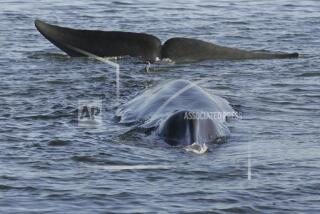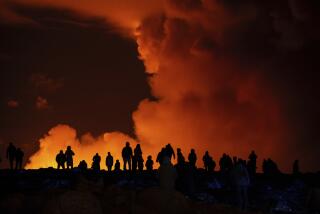Old Touches Kept : Reykjavik a Homey Setting for Conference
REYKJAVIK, Iceland — Reykjavik, set among the snow-streaked fiords of Iceland and under the ice-blue northern skies of the Atlantic, is a small, modern capital where people speak softly, hang on to old homey ways and impress visitors with prideful accounts of old Icelandic history and culture.
Icelanders were surprised that President Reagan and Soviet leader Mikhail S. Gorbachev suddenly settled on Reykjavik as the site of their summit conference next weekend. But no Icelander seems awed by the selection. They feel sure that Reykjavik, small as it is, can cope and that Iceland, rich as it is in both antique and modern achievement, can make itself better known throughout the world.
A little more than 130,000 people live in Reykjavik and its suburbs--55% of the total population of Iceland--but most of the capital’s population is relatively new. Reykjavik has grown by five times or more since World War II.
‘Was Like a Fishing Village’
“When I was a boy, and I am 56 years old now, Reykjavik was like a fishing village,” said editor Matthias Johannessen at his offices in the daily newspaper Morgunbladid. “Life was something like the way Isaac Bashevis Singer describes life in his little villages.”
As a result, despite the cars that crowd the streets in the hunt for scarce parking slots and the modern concrete apartment blocks going up by the seafront, Reykjavik still keeps touches from a bygone time.
At tea on a recent afternoon, lawyer Gudjon Strykarsson, and his wife, Agusta, a schoolteacher, talked about the increase in crime in the last few years. Gudjon believed that they should lock the door of their home when go to work each day, but Agusta did not like the idea. They already locked their door when they slept at night and that seemed sufficient to her.
“Years ago,” she said, “our doors did not even have locks.”
Images of smallness and tranquility and old ways abound. For 20 years, ever since television began in Iceland, there has been no telecasting on Thursdays, giving Icelanders at least one free night to attend meetings, converse with friends and family, go to the movies, or read.
The phone book lists almost everyone alphabetically by first name rather than last. This follows standard Icelandic practice, for most people do not use family names the way Americans or Scandinavians or other Europeans do. Instead, Icelanders use their father’s first name as a second name, adding “son” if male or “dottir” if female. Vigdis Finnbogadottir, the former professor of French who is president of Iceland, is thus known by everyone as Vigdis, her second name indicating only that she is the daughter of Finnboga.
Television announcements have appealed for all Icelanders to stay away from Reykjavik restaurants this week, making room at tables for the 3,000 or so journalists and officials coming for the Reagan-Gorbachev summit. The appeal reflects how few facilities there are in Reykjavik to take care of so many visitors. The town has fewer than 1,000 hotel beds and only 10 restaurants that are listed in the official hotel and restaurant guide as those with “full service international menu.”
Site for Previous Summits
Reykjavik has hosted a major international event twice before--the world championship chess match between American Bobby Fischer and Russian Boris Spassky in 1972 and the summit conference between President Richard M. Nixon and French President Georges Pompidou in 1973--but neither event required as much organization and security or attracted as many journalists as the impending Reagan-Gorbachev summit.
The U.S. government had to postpone a trip by an advance team of American officials for one day last week while U.S. Embassy staff telephoned frantically throughout Reykjavik for housing. The shortage in housing is being made up by Reykjavik residents who, in response to government appeals, are renting private rooms and apartments to visitors. Children at two schools have been given a week’s holiday so the school buildings can be fashioned into press centers.
Icelanders are confident that the job will be done. “If they had given us three months,” said Bjarni Sigtryggsson, the assistant manager of the Saga Hotel, with a smile, “we could not have done it. But since we only have ten days, we are doing it, because we have to.”
Icelanders are also proud of their climate. Despite the name of their country and its location just south of the Arctic Circle, Reykjavik residents like to make the point that their winter climate is not much different from that of New York. Reykjavik, which is warmed by the Gulf Stream, has only 52 days of snow a year. It takes record cold levels to bring temperatures below zero.
Yet an unseasonal snow began to fall last Thursday, and it has been chilling, wet and nasty most of the time since. “Perhaps Iceland,” said an office secretary, “decided to really look like Ice-land when the two great men meet here.”
Chilled Relations
The conference will be held at a rather chilling time in U.S.-Icelandic relations as well. Although some opposition parties have complained about it in the past, the American-run North Atlantic Treaty Organization anti-submarine base at Keflavik with its 4,000 American servicemen and dependents is not an issue. But whaling is.
Under pressure from the U.S. government, Iceland, which had been catching 400 whales a year, announced that it would abide by an international moratorium on whaling. But Iceland nevertheless killed 120 whales this year, proclaiming it part of a scientific research program to determine whether the stocks of whales are really dwindling.
Both the U.S. government and the environmental organization Greenpeace have denounced the continued killing, and there has been a good deal of bickering. Although it only has a population of 240,000, Iceland does not like to behave like a people only one-tenth of 1% the size of the United States.
“Iceland refuses to accept that Washington is the capital of Iceland,” said Matthias Johannessen, the editor. “We are united against the United States on this issue. You know, we were quarreling among ourselves about the whaling at first. But the United States and Greenpeace have put us all in the same boat.”
As part of their expression of solidarity, some Icelanders are beginning to eat more whale meat, as if to prove that whaling is a national necessity and not just a way of earning money from Japan, the main purchaser of Icelandic whale meat.
Icelanders, in fact, possess an extraordinary homogeneity, almost every one Lutheran and almost every one descended from Norwegian Vikings who settled in Iceland more than a thousand years ago. Early islanders created the world’s first Parliament and the long sagas that are regarded as some of the finest medieval writing in the world.
Iceland, under Norwegian and then Danish rule, went through a dark period in which the population sometimes came close to extinction, but it somehow managed to survive over centuries with its medieval language, literacy and culture intact. But the Icelanders were too weak and poor to leave great structures behind.
“We did not build cathedrals,” said Matthias Johannessen. “Books were our cathedrals.”
Books are still prized. Publishers produce 300 new Icelandic books a year for a population that is nearly 100% literate.
Although a handful of refugees like Vietnamese boat people have come from time to time, Iceland has hardly any immigrant population.
Homogenous Society
“There is no deliberate policy to keep foreigners out,” said Sveinn Eldonn, a Foreign Ministry official. “We are not hostile to foreigners. People have not given their homogeneity much thought. We are such a similar population that everyone knows everyone else and who their parents are. They can trace their roots rather easily. But there is no racist element here.”
Until World War II, Iceland was a land of fishermen and farmers with its capital, Reykjavik, an administrative and commercial center of perhaps 30,000. The island itself was then a self-governing country under the Danish crown much like Canada was a self-governing dominion of the British Empire. When Denmark fell to Nazi Germany, Britain seized Iceland to prevent a German takeover.
American forces followed a year later to build an airport, drawing Icelandic labor from the countryside with high wages and precipitating the modernization of Iceland and the enormous growth of Reykjavik. With support from the wartime allies, the full independence of Iceland from Denmark was declared in 1944.
The city reflects this history. There is a small pocket of its past--quaint, red and green corrugated iron homes; a few small but stately buildings used by Parliament, the president and prime minister; old Lutheran churches with stark spires--in the few downtown streets and the old residential quarter built around a lake. But this old town is overwhelmed by a procession of ugly, functional blocks of apartments built to house the Icelanders who continue to move to Reykjavik.
In fact, the town, like many American cities, is beginning to lose its downtown as a center. Many new institutions like the university, the museum, and hotels are built in newer neighborhoods farther out. Some of the ugly structures mar the beauty of the breathtaking scenery around the town, but there is no pollution. The entire city is heated by hot mineral springs that are piped from underground into the central heating plants of almost every building.
Haunted House
Despite the newness of the city, Icelanders cannot help talking about their past. The government has offered Reagan and Gorbachev use of a large white house by the sea as a meeting place. This house, known as the Hofdi, serves as the site for government ceremonial banquets and other occasions these days, but it has a past.
It was built in 1909 by the French consul but later bought by Einar Benediktsson, an Icelandic poet and lawyer. Editor Matthias Johannessen said that Benediktsson, acting in a legal case, uncovered the fact that a young woman in another part of the country had unknowingly committed incest with her brother and bore him a child. When she was told that her lover was a long lost brother, she killed herself and then, according to Icelandic legend, came back to haunt the poet in his Reykjavik home. The legend insists that she still moves through the house.
“Icelanders say,” reported Johannessen, “that if Reagan and Gorbachev meet in that house, someone will be looking over their shoulders.”
More to Read
Sign up for Essential California
The most important California stories and recommendations in your inbox every morning.
You may occasionally receive promotional content from the Los Angeles Times.










